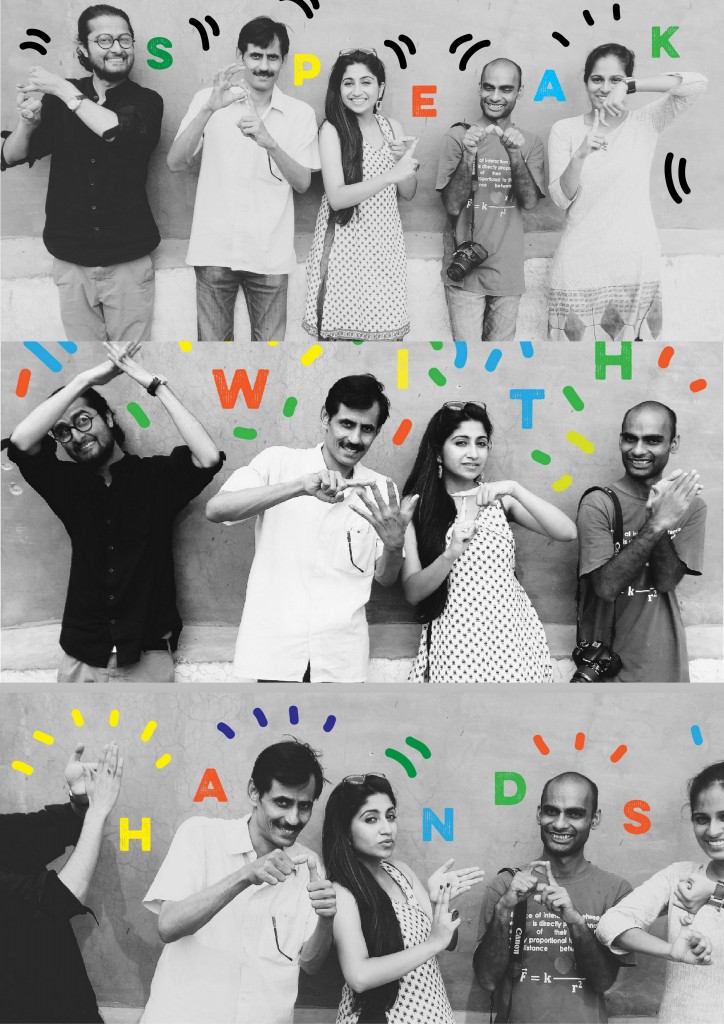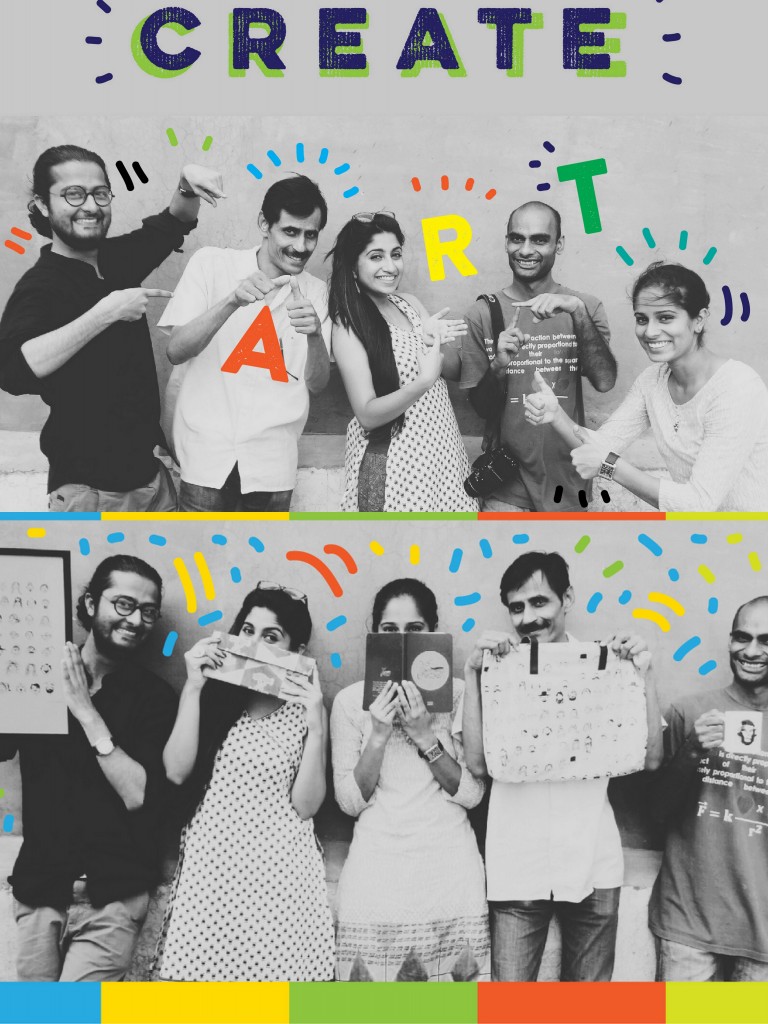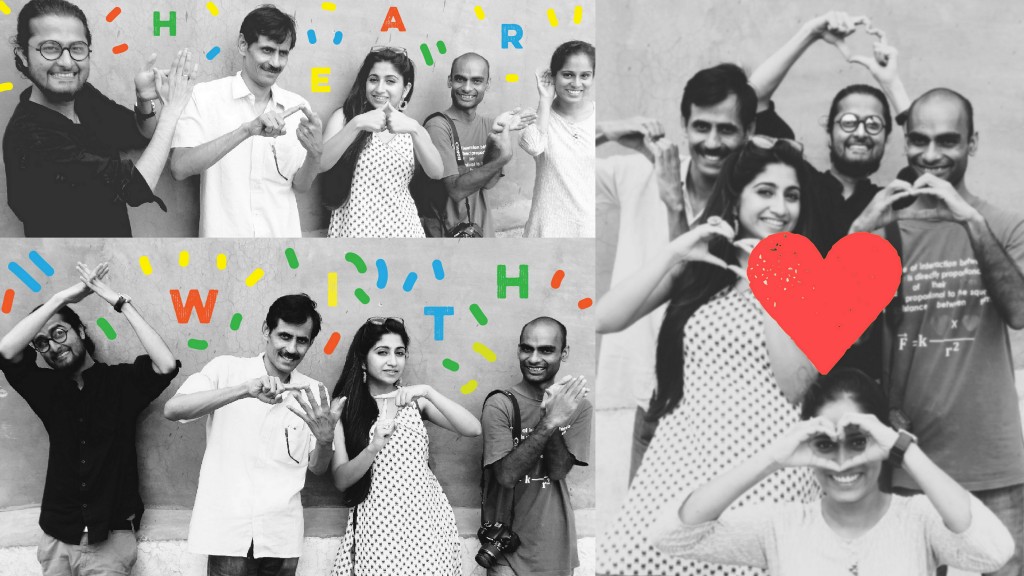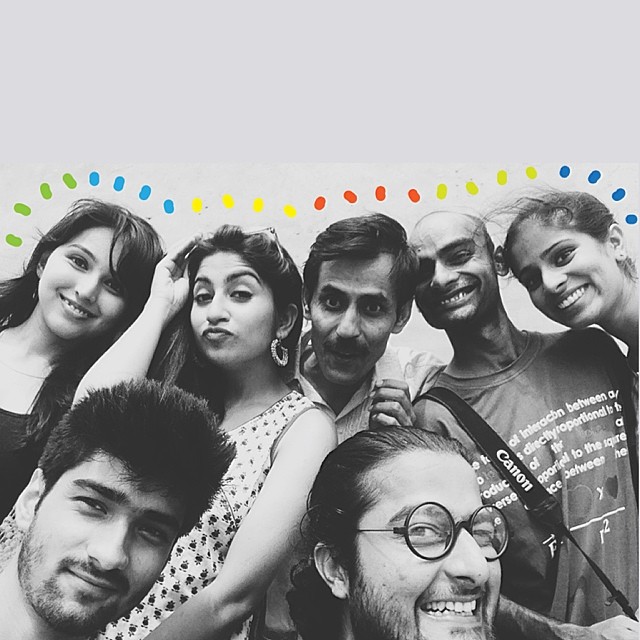The Art of Signs – Learn from Atulyakala’s Smriti and Harshit
In the interiors of Dwarka Mor as you walk up the stairs of an old built house, on opening the door you see a beautifully painted wall with a poster which reads Atulyakala; a word synonymous with “art, unparalleled” as it is the deaf artists that find their space in the commercial world through this social enterprise. Walk inside and you see a team of five people (two deaf and three hearing) who use nothing but their hands, for creating beautiful visual art as well as for interacting with each other. Silence and Creativity are in the air at Atulyakala.
Smriti Nagpal(Founder) and Harshit Vishwakarma(Co-Founder) are the two visionaries behind this innovative firm that tries to bridge the gap between the deaf and the hearing by a simple motto that creativity simply flows, without the need of words. They design various artistic products such as bags, clutches, handbooks and mugs, finally selling them online.
Here is an insight into the ideas and thoughts of the two young and talented entrepreneurs:
Q. What triggered you to start up?
A. Smriti: I have two deaf siblings and so had been working as a sign language interpreter since the age of 16. Somewhere after my graduation days I met Amit (now, the visual artist at Atulyakala) at an NGO who had unbelievable qualifications in arts and a conversation with him made me understand how his creativity was being completely wasted. Though I didn’t know how to help him then, I spoke to Harshit about it and we eventually came up with the idea of Atulyakala.
Harshit: Being a former student of College of Art I had seen fellow deaf students in the college but due to the communication gap they remained isolated. I always wanted to collaborate with them in some way and have an exchange of creativity but it was after we thought of starting Atulyakala that I realized that creativity flows and has no language barriers. Me and Amit bhaiya(as the deaf artists are fondly addressed as) used to do “Art Jamming” in the starting days, our coordination and excellence made me believe that this will work.
Q. What roadblocks paved your way till this successful position?
A. Smriti: It was difficult to form that emotional connect with the customer and to embed the different aspects together- deaf artists, sign language, designs into one product.. Also, to build a trust in the deaf community was a time taking process since most of them had already faced so much exploitation earlier.
Harshit: (nodding) Yes! Also, we want people to appreciate the process that goes behind the making of these products, which makes Atulyakala stand out! They must understand how each products makes a difference in the lives of the deaf.
Q. How did you have your first sale?
A. Harshit: It was after around two months of starting up that we sold a product at an online store which was when we realized that selling is not a difficult task as long as you ensure that your products are good and different.
Q. How did you scale up?
A. Smriti: Initially we started with the simple idea of working with deaf artists, without any other direction but it was during the process of working that ideas shaped up.
Harshit: We kept pushing our boundaries and did things we’d probably never imagined to do! I remember doing a challenging assignment along with Amit bhaiya(the visual artist) for a big wedding photographer. The success of this project acted as a motivator.
Q. What is your team size?
A. Smriti: We have a team of 6 people as of now, of which 2 are deaf artists.
 Q. How did you get funds for your business?
Q. How did you get funds for your business?
A. Smriti : (looks intensely) Oh funds? Well, we’ve been bootstrapping and investing from our pockets. (laughs)
Harshit: (Laughs along) Yes, that’s true! For social enterprises it is difficult in the first year to get investors since we work for a social cause as well as earn profits so it is only after being a little established that investors begin to look at your work. Now that we are more than a year old, we have been working on the funds and sending proposals.
Q. How has your business plan changed from what it was when you started up?
A. Smriti: As stated earlier, we only thought of working with deaf artists. The idea of such products and sale developed later. Also, there is a shift from hand painted products to digital works to widen the opportunities. Because we emphasise a lot on sign language, we are trying to embed it in every product of ours from now on.
Harshit: The core values and business philosophy remains the same but the structure has seen changes while evolving. Experiences and exposure brings about certain changes, which are for the better!
Q. Does it help to have two founders for a start up? If yes, how?
A. Smriti: (both smile at each other) Having two founders, we think has its own special advantages & can bring in disproportionately rich rewards.
Harshit: We think it brings in a multi-dimensional view of matters. It decreases the workload, and enables us to give more time & attention to areas of expertise.
Q. A few years from now, where do you both see Atulyakala?
A. Smriti: We are hoping to have more deaf artists soon and trying to get a good number of funders as well. Hopefully, by giving this support now we’ll reach a stage where Atulyakala will be self sustained.
Harshit: (nodding) Yes, we want more and more creative collaborations and projects, involving an increasing number of deaf artists.
Q. Do you think it is good to get corporate experience before starting up?
A. Srimiti: Experience definitely helps while structuring your business plans but in the case of social entrepreneurship it is the one to one connect with the community you work which matters most!
Harshit: Exactly! That’s how we are different from other businesses.
Q. How easy was it to convince your family?
A. Smriti: Honestly speaking, we still live in a society where it ultimately matters how much goes into your bank account at the end of the month. However, since I had been working for the deaf community from before, my parents gradually accepted this. Though they still have their apprehensions but they trust my work.
Harshit: It’s similar! They are apprehensive but supportive seeing the work being done.
Q. What sites do you refer to for inspiration, both emotional and creative?
A. Smriti: Though there are so many but only for the sake of naming one this is quite an emotionally inspirational site https://www.ted.com/talks/browse
Harshit: There is nothing in particular, we keep surfing the net but these are some good sites to refer: https://www.behance.net/
http://artistsinspireartists.com/
https://www.pinterest.com/
Q. How far are you willing to go to make Atulyakala a successful social enterprise? What if your plans don’t work out?
A. Smriti: The idea behind Atulyakala started as a simple act & response to a need. The need of effective communication & interaction between the two communities.
Harshit: The plan is to keep at it, learn from the mistakes & make it work. Simple!
Q. What are the important lessons that you would give to our readers?
A. Smriti:
- Give time on developing a plan and doing enough research, keeping the financial aspect in mind.
- Share your ideas with a lot of people.
- Ensure that the business philosophy remains the same throughout.
- Believe in team work, you can’t walk alone.
Harshit:
- Make short term goals and try to achieve them.
- Build a community around the work you do who adopt your work.
- Don’t run after perfection, it comes with time.
Q. How would you describe your journey in a few words?
A. Smriti: Overwhelming, challenging and enriching (looks at Harshit and laughs) I stole away all the words, think now!
Harshit: (laughs and imitates an evil look) Well, I still can – gratifying, creative and fun
With this interaction it is only their laughter that is heard in the room as their use of hands for signing substitutes for everything else in this world.
Art, unparalleled it is after all!
Writer| Sanskriti Bhatia
Photographer| Karan Anand
Editor| Harshit Vishwakarma
Curators| TYS Team















